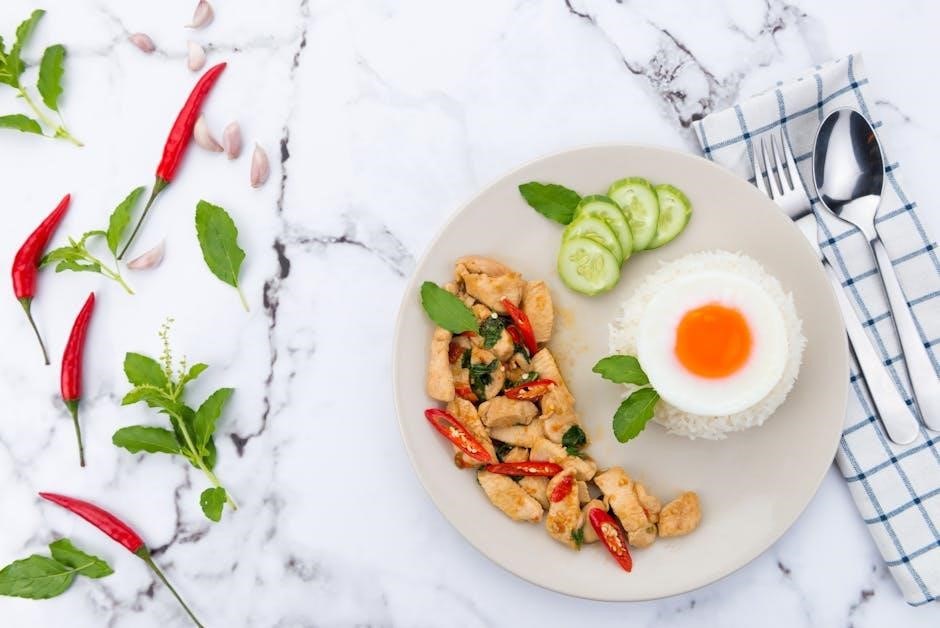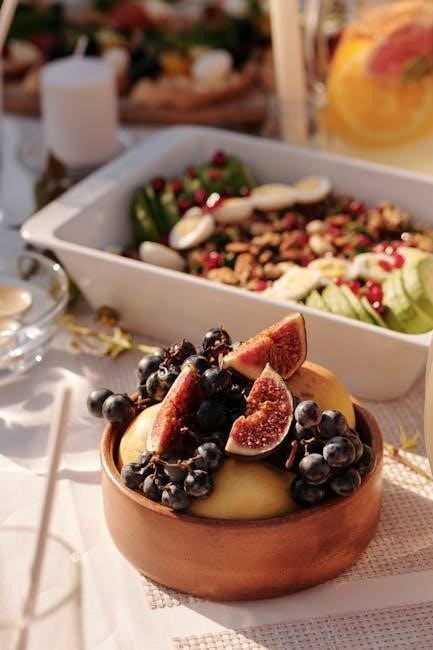Transform your health with a structured 7-day alkaline meal plan, designed to reset eating habits and promote balanced nutrition. This guide offers simple, nutritious recipes for breakfast, lunch, dinner, and snacks, focusing on alkaline-rich foods to enhance overall well-being. Perfect for beginners, it provides a clear roadmap to adopting a healthier lifestyle, with options to suit various preferences and dietary needs. Discover how this plan can help boost energy, support weight loss, and improve digestion, all while enjoying delicious and varied meals.
What is an Alkaline Diet?
An alkaline diet focuses on consuming foods that promote a balanced pH level in the body, emphasizing fruits, vegetables, and whole grains while minimizing processed foods and meats. It aims to reduce acidity, which can lead to inflammation and health issues. By prioritizing alkaline-rich foods, individuals can support immune function, digestion, and overall well-being. This dietary approach is popular among health-conscious individuals and celebrities, often recommended for its potential to enhance energy levels and support weight loss naturally.
Benefits of Following an Alkaline Diet
Adopting an alkaline diet offers numerous health benefits, including improved energy levels, enhanced digestion, and a stronger immune system. By reducing acidity, it may help prevent chronic diseases and inflammation. Weight loss is another potential advantage, as the diet encourages healthier eating habits. Many followers report better skin health and reduced bloating. Overall, an alkaline diet promotes long-term well-being and can be a sustainable choice for those seeking a balanced lifestyle. It’s a popular choice for those looking to rejuvenate their health naturally.
Why Choose a 7-Day Meal Plan?
A 7-day alkaline meal plan is an excellent way to kickstart your journey toward better health. It provides a structured and organized approach to nutrition, ensuring variety and balance. With a clear schedule, it helps maintain consistency, which is key to seeing results. The plan is ideal for beginners, offering simplicity and ease of execution. It also saves time on meal decision-making, allowing you to focus on preparing delicious, alkaline-rich dishes. A 7-day plan is a great introduction to a long-term commitment to alkaline eating, making it easier to adopt healthier habits.

Understanding Alkaline Foods
Alkaline foods promote a healthier body by balancing pH levels, boosting immunity, and aiding weight loss. They support overall well-being and are key to an alkaline diet.
Top Alkaline Foods to Include
Incorporate leafy greens like spinach, kale, and collards, as they are rich in alkaline-promoting chlorophyll. Cruciferous vegetables such as broccoli and Brussels sprouts are also excellent. Fresh fruits like lemons, oranges, and berries, though acidic in taste, contribute alkalinity. Nuts and seeds, especially almonds and chia seeds, are alkaline and nutrient-rich. Herbs and spices like turmeric, ginger, and parsley add alkalinity and flavor. Avocados and olive oil are great sources of healthy fats. These foods help create a balanced and pH-friendly diet, supporting overall well-being and energy levels throughout your 7-day meal plan journey.
Foods to Avoid on an Alkaline Diet
To maintain an alkaline diet, avoid acid-forming foods like processed meats, dairy, sugary snacks, and refined grains. Limit alcohol, caffeine, and carbonated beverages, as they can disrupt pH balance. Red meat, poultry, and seafood are also acidic. Avoid foods high in preservatives, artificial additives, and trans fats. These foods can hinder the body’s natural alkalinity, making it harder to achieve the benefits of your 7-day meal plan. Focus on eliminating these to support your alkaline journey and improve overall well-being.
Importance of pH Balance in Nutrition
Maintaining pH balance is crucial for optimal health. Our bodies function best when blood pH levels are slightly alkaline, around 7.35–7.45. An imbalanced diet heavy in acidic foods can strain the body’s regulatory systems, potentially leading to fatigue, inflammation, and chronic diseases. By focusing on alkaline-rich foods, you support the body’s natural pH equilibrium, enhancing energy levels, digestion, and overall well-being. A balanced pH promotes long-term health and vitality, making it a cornerstone of the 7-day alkaline meal plan.

How to Create a 7-Day Alkaline Meal Plan
Creating a 7-day alkaline meal plan involves assessing dietary needs, planning balanced meals, and incorporating alkaline foods. Focus on variety and nutrient-dense recipes for optimal health.
Step-by-Step Guide to Meal Planning
Start by defining your dietary goals and preferences. Plan meals for each day, ensuring variety and nutrition. Create a grocery list of alkaline foods like vegetables, fruits, and lean proteins. Prep meals in advance to save time and stay consistent. Include hydration options, such as alkaline water and herbal teas. Adjust portion sizes based on calorie needs and activity levels. Review and modify the plan weekly to maintain balance and ensure long-term sustainability. Stick to alkaline-friendly ingredients and avoid acidic foods for best results.
Essential Ingredients for an Alkaline Kitchen
Stock your kitchen with fresh vegetables like spinach, cucumbers, and bell peppers. Include a variety of fruits such as lemons, limes, and grapefruits. Whole grains like quinoa and brown rice are alkaline-friendly. Healthy fats like olive oil and avocado support nutrition. Incorporate nuts and seeds, such as almonds and chia seeds. Herbs like basil, parsley, and mint add flavor naturally. Alkaline water and herbal teas promote hydration. Fermented foods like kimchi and sauerkraut aid digestion and balance. These ingredients form the foundation of a balanced alkaline diet, ensuring meals are nutritious and flavorful.
Tips for Meal Prepping
Plan your meals for the week ahead to ensure consistency. Portion and store meals in airtight containers to maintain freshness. Prepare grains, vegetables, and proteins in advance for easy assembly. Chop fruits and veggies ahead of time for quick snacks. Cook alkaline-friendly meals in bulk, like soups or salads, for convenience. Label and date all prepped meals to stay organized. Reheat safely and refrigerate within two hours to preserve nutrients and safety. This approach saves time and helps maintain your alkaline diet routine effortlessly.

Day 1: Starting Your Alkaline Journey
Welcome to your first day of the alkaline meal plan! This is your introduction to a diet rich in fresh, nutrient-dense foods that promote balance and vitality. Start with foundational alkaline recipes and set the tone for a week of nourishment and renewal. Focus on hydration and whole foods to build momentum for your journey ahead.
Breakfast Ideas
Begin your day with alkaline-friendly breakfasts that nourish and energize. Try a green smoothie with spinach, avocado, and lemon for a refreshing start. Chia pudding with almond milk and fresh berries is another great option. Whip up a tofu scramble with turmeric and veggies for a protein-packed meal. Alternatively, enjoy a bowl of oatmeal topped with sliced almonds and a drizzle of almond butter. These options are rich in nutrients and set a healthy tone for your alkaline journey. Incorporate hydration with a glass of lemon water to kickstart digestion.
Lunch Options
For lunch, focus on alkaline-rich options like fresh salads, vegetable wraps, and hearty soups. A mixed green salad with cucumbers, bell peppers, and avocado, dressed with olive oil and lemon juice, is a great choice. Try a quinoa wrap with roasted veggies and hummus for a satisfying meal. Alternatively, opt for a vegetable soup with leafy greens like kale or spinach. Pair your meal with a side of steamed vegetables or a small portion of brown rice for a balanced and nourishing lunch that supports your alkaline goals.
Dinner Recipes
For dinner, opt for alkaline-rich meals like stuffed bell peppers with quinoa, mushrooms, and spinach. Grilled salmon with a side of steamed asparagus and lemon-herb sauce is another excellent choice. Roasted vegetable medleys, such as zucchini, eggplant, and cherry tomatoes, drizzled with olive oil, are nutritious and flavorful. Pair your meal with a small portion of brown rice or a fresh green salad. These recipes are designed to promote pH balance and support overall health while keeping your evenings satisfying and delicious.
Snacks and Desserts
Enjoy alkaline-friendly snacks like fresh fruit slices, trail mix with almonds, or veggie sticks with hummus. For desserts, opt for fruit salads, chia pudding with coconut milk, or dark chocolate squares (70% cocoa or higher). These options are rich in nutrients, low in acidity, and support overall wellness. Incorporate herbs like mint or basil for added flavor without compromising pH balance. These choices keep you satisfied and aligned with your alkaline goals throughout the day.

Day 2: Boosting Energy Levels
Focus on nutrient-dense meals to enhance vitality. Incorporate leafy greens, citrus fruits, and whole grains to naturally boost energy levels throughout the day.
Nutrient-Packed Breakfasts
Start your day with alkaline-rich breakfasts to fuel energy. Spinach and avocado smoothies, chia seed pudding with fresh berries, or whole-grain toast with almond butter are excellent choices. These meals provide sustained energy and essential nutrients like vitamins, minerals, and healthy fats. Incorporate citrus fruits like oranges or grapefruits for a refreshing boost. Herbal teas or green juices can complement these meals, ensuring a balanced and energizing start to your day. Prioritize whole, unprocessed foods to maximize nutritional benefits and maintain alkalinity.
Healthy Lunch Choices
Opt for alkaline-friendly lunches that nourish and energize. Fresh vegetable salads with mixed greens, cucumbers, and bell peppers, dressed with olive oil and lemon, are ideal. Incorporate lean proteins like grilled chicken or tofu for satisfaction. Whole-grain wraps with avocado and sprouts or quinoa bowls with roasted vegetables are also great options. Alkaline soups, such as spinach or zucchini soup, provide hydration and nutrients. Pair meals with a side of fresh fruit or a green smoothie for added vitality and pH balance.
Nourishing Dinners
Conclude your day with alkaline-rich dinners that promote balance and rejuvenation. Grilled or roasted vegetables like zucchini, eggplant, and Brussels sprouts are excellent choices. Pair them with quinoa or brown rice for a protein-packed meal. Leafy green stir-fries with spinach, kale, or Swiss chard, seasoned with herbs like turmeric and garlic, are highly alkaline. Baked sweet potatoes with a drizzle of olive oil and a sprinkle of cinnamon also make a satisfying, nutritious option. These meals support pH balance and overall well-being.
Alkaline Snacks
Keep your energy levels steady with alkaline snacks that nourish and refresh. Fresh fruits like apples, berries, and citrus are ideal, as they are rich in vitamins and antioxidants. Raw vegetables such as cucumbers, carrots, and bell peppers with hummus make a satisfying crunch. Nuts and seeds like almonds, pumpkin seeds, and chia seeds are great sources of healthy fats and minerals. Herbal teas or water with lemon or lime are excellent for hydration and pH balance. These snacks support your body’s natural detoxification processes and maintain vitality throughout the day.

Day 3: Incorporating Variety
Incorporate variety by introducing diverse alkaline ingredients, ensuring a balanced mix of flavors and textures. Explore new recipes to keep your meals exciting and nutritious.
Creative Breakfast Recipes
Start Day 3 with vibrant, nutrient-dense breakfasts. Try a spinach, mushroom, and bell pepper skillet with alkaline spices. Alternatively, whip up a green smoothie bowl with kale, banana, and almond milk, topped with chia seeds and fresh berries. For a hearty option, prepare stuffed bell peppers with quinoa, avocado, and a hint of turmeric. These recipes ensure variety, flavor, and a boost of alkaline nutrients to kickstart your day. Experiment with colors and textures to keep your meals engaging and satisfying.
Balanced Lunch Ideas
For a midday meal, opt for alkaline-rich salads like kale with lemon-tahini dressing or mixed greens with cucumber and avocado. Try quinoa or brown rice bowls topped with roasted vegetables and chickpeas. Grilled vegetable wraps with zucchini, bell peppers, and hummus are also ideal. Incorporate alkaline proteins like tofu or edamame for variety. These meals are nutrient-dense, pH-balanced, and designed to sustain energy levels while supporting overall health and digestion. Pair with herbal tea or infused water for added hydration.
Flavorful Dinner Options
Alkaline dinners can be vibrant and satisfying. Try stuffed bell peppers with quinoa, spinach, and herbs, or a hearty vegetable stir-fry with turmeric and ginger. Baked sweet potato topped with black beans, avocado, and salsa is another delicious option. Grilled portobello mushrooms with roasted vegetables and a side of steamed greens also make for a flavorful meal. These recipes are designed to balance pH levels while offering rich, satisfying flavors that support overall well-being and energy.
Low-Acid Snacks
Low-acid snacks are ideal for maintaining pH balance. Try cucumber slices with hummus or fresh veggie sticks like carrots and celery with a light guacamole dip. Fresh fruit options include apples and pears, which are naturally low in acidity. Sliced almonds or a small handful of trail mix with alkaline-friendly nuts like almonds and pumpkin seeds are also great choices. These snacks support digestion and provide sustained energy without disrupting your body’s alkaline balance.

Day 4: Focus on Hydration
Hydration is key to flush toxins and maintain alkalinity. Incorporate water-rich foods like cucumbers and celery, and drink alkaline water throughout the day for optimal balance.
Alkaline Smoothies and Juices
Start your day with refreshing alkaline smoothies and juices. Blend spinach, kale, or cucumber with alkaline fruits like berries or citrus for a nutrient-packed drink. Add hydrating ingredients like coconut water or celery to enhance the detoxifying effects. These beverages help flush toxins and maintain pH balance. Opt for cold-pressed juices to preserve enzymes and nutrients. Incorporate ginger or lemon for a boost of flavor and digestion support. These drinks are perfect for hydration and alkalinity, keeping you refreshed and energized throughout the day.
Hydrating Lunch Options
Incorporate hydrating ingredients into your lunches to support alkalinity and energy. Opt for salads with cucumbers, celery, and mixed greens, dressed with olive oil and lemon. Add alkaline proteins like grilled tofu or chicken for sustenance. Include watery vegetables like bell peppers and zucchini for extra hydration. Quinoa or brown rice can serve as alkaline bases. Pair meals with herbal teas or infused water to enhance hydration. These options replenish fluids and maintain pH balance, keeping you refreshed and focused throughout the day.
Dinners for Optimal Hydration
Focus on hydrating dinners with alkaline ingredients to replenish fluids and support detoxification. Try cucumber and celery stir-fries with zucchini noodles, seasoned with alkaline herbs like parsley and mint. Include grilled tofu or chicken for protein. Serve with a side of quinoa or brown rice for fiber. Dress with olive oil and lemon juice to enhance hydration. Pair with herbal tea or infused water to further boost hydration levels and maintain a balanced pH throughout the evening.
Herbal Teas and Infused Waters
Incorporate herbal teas like peppermint, chamomile, and hibiscus to enhance hydration and support detoxification. Hibiscus tea, rich in antioxidants, helps lower acidity and improve digestion. For infused waters, combine cucumber, lime, and mint for a refreshing alkaline drink. Adding slices of lemon or orange can further enhance hydration and pH balance. These beverages not only replenish fluids but also contribute to an alkaline environment, supporting overall health and vitality throughout your 7-day meal plan journey.

Day 5: Enhancing Digestion
Focus on digestion-friendly meals with leafy greens, cucumbers, and celery. Incorporate ginger and mint for added benefits. Stay hydrated with alkaline water or herbal teas to reduce acidity and promote a balanced pH, supporting digestive health and overall well-being.
Digestion-Friendly Breakfasts
Start your day with smoothies made from spinach, pear, and ginger, or try chia pudding with almond milk and berries. Incorporate cucumber and celery for their anti-inflammatory properties. Opt for warm alkaline water with lemon to kickstart digestion. Herbal teas like peppermint or chamomile can also aid in reducing bloating and inflammation; These breakfast options help maintain a balanced pH, promoting a healthy digestive system and improving nutrient absorption throughout the day.
Lunch Recipes for Gut Health
Focus on alkaline-rich salads with mixed greens, cucumbers, and bell peppers, dressed with olive oil and lemon. Try quinoa bowls with roasted zucchini and turmeric for anti-inflammatory benefits. Incorporate vegetable wraps with hummus, spinach, and avocado, using alkaline water in the hummus. These recipes promote gut health by balancing pH levels, reducing inflammation, and supporting beneficial gut bacteria. Each option is easy to digest and packed with nutrients for optimal wellness.
Dinner Ideas to Support Digestion
Opt for gentle, alkaline-rich dinners like steamed vegetable stir-fries with turmeric and ginger. Try lentil or vegetable soups with alkaline-friendly broth. Baked fish with lemon and herbs, paired with a side of sautéed greens, supports digestion. Include soft-cooked vegetables like zucchini and carrots to ease digestion. These meals are designed to reduce acidity, promote gut comfort, and enhance nutrient absorption, ensuring a balanced and restorative end to your day.
Snacks for a Healthy Gut
Incorporate snacks like raw vegetables, such as celery sticks or cucumber slices, paired with a gentle dip like hummus. Alkaline nuts like almonds or pumpkin seeds support digestion. Fresh fruit, such as apples or pears, provides fiber and natural enzymes. Herbal teas, like chamomile or peppermint, can soothe the gut. Avoid processed or high-acid snacks. These options promote a balanced gut, aiding digestion and overall well-being throughout your alkaline journey.

Day 6: Balancing Macronutrients
Focus on harmonizing proteins, carbs, and fats to optimize energy and satisfaction. Include lean proteins, whole grains, and healthy fats in balanced portions to support overall wellness.
Protein-Rich Breakfasts
Start your day with alkaline-friendly protein sources like eggs, tofu, or chia pudding. Eggs can be poached or scrambled with spinach for added nutrition. Tofu scramble with turmeric and herbs is a great vegan option. Chia pudding made with almond milk and topped with fresh berries provides sustained energy. Smoothies with plant-based protein powder, kale, and pineapple also work well. These options help maintain energy levels and support muscle health without compromising alkaline balance. Pair with a glass of lemon water for hydration.
Carb and Fiber Balances at Lunch
For a balanced lunch, focus on whole grains like quinoa, brown rice, or whole-grain wraps. Pair these with alkaline vegetables such as spinach, broccoli, or bell peppers. Include a mix of healthy fats like avocado or olive oil to enhance nutrient absorption. Add legumes or tofu for protein. A fresh green salad with chickpeas and a lemon-tahini dressing is another excellent option. These meals provide sustained energy, support digestion, and maintain the body’s alkaline balance while offering a variety of flavors and textures.
Dinners with Healthy Fats
Incorporate healthy fats into your evening meals for sustained energy and better nutrient absorption. Opt for grilled salmon with a side of steamed alkaline vegetables like asparagus or zucchini. Avocado can be added to salads or used as a topping for quinoa or brown rice bowls. Stir-fries with olive oil, featuring alkaline greens and tofu, are also ideal. These meals support heart health, improve digestion, and provide essential fatty acids while maintaining alkaline balance.
Macronutrient-Diverse Snacks
Snacks should balance proteins, carbs, and fats for sustained energy. Almonds and pumpkin seeds provide healthy fats and protein, while cucumber or bell pepper slices add alkaline carbs. A small portion of quinoa or brown rice cakes with avocado is another great option. Pairing fresh berries with a handful of walnuts offers natural sweetness and a boost of omega-3s. These snacks support energy levels, satisfy cravings, and maintain alkaline balance without overloading on any single macronutrient.

Day 7: Finalizing Your Plan
Conclude your week by reflecting on progress, celebrating small victories, and planning future meals. Enjoy a nourishing dinner, prepare snacks for tomorrow, and stay committed to your alkaline journey.
Breakfast to Recharge
Start Day 7 with a revitalizing breakfast to recharge your body. Opt for a spinach and berry smoothie with almond butter for a nutrient-packed start. Alternatively, enjoy a chia pudding bowl with coconut milk, topped with fresh fruits and nuts. These meals are rich in alkaline-promoting ingredients and provide sustained energy. Pair with a glass of lemon water or herbal tea for hydration. These options are easy to prepare and set a positive tone for the day ahead.
Lunch for Sustained Energy
For a midday meal that fuels your energy, try a quinoa salad with roasted vegetables like zucchini, bell peppers, and spinach. Add a citrus vinaigrette dressing for flavor and a boost of alkalinity. Alternatively, enjoy a vegetable wrap with hummus, avocado, and fresh greens like kale or collard leaves; Pair your lunch with a glass of lemon water or herbal tea to maintain hydration and support your body’s natural pH balance for sustained vitality throughout the day.
Dinner to Celebrate Progress
Celebrate your week-long commitment with a hearty alkaline dinner. Grilled or baked vegetables like asparagus, Brussels sprouts, and sweet potatoes are perfect, paired with a side of quinoa or brown rice. Add a fresh green salad with olive oil and lemon dressing for extra nutrition. Conclude your meal with a refreshing cucumber and mint water or a soothing herbal tea. This balanced dinner supports your energy levels and marks a successful completion of your 7-day alkaline journey, leaving you feeling accomplished and rejuvenated.
Snacks to Maintain Momentum
Keep your energy steady with simple, alkaline snacks. Sliced cucumbers, bell peppers, or carrots with hummus make a refreshing choice. Fresh fruits like apples, berries, or citrus are also ideal. A handful of raw almonds or pumpkin seeds provides healthy fats and protein. For a sweet treat, try dates or a small serving of coconut yogurt. These snacks are easy to prepare, nutrient-dense, and perfect for maintaining your alkaline lifestyle beyond the 7-day plan, ensuring you stay on track with your health goals.
